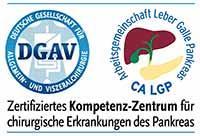Treatment of Gastrointestinal Carcinoid Tumors with CRS and HIPEC - hyperthermic intraperitoneal chemotherapy
Treatment prices are regulated by national law of the corresponding countries, but can also include additional hospital coefficients. In order to receive the individual cost calculation, please send us the request and medical records.

Department of General, Abdominal, Transplant, Hepatopancreatobiliary, Colorectal, Endocrine, Bariatric Surgery and Hernia Surgery
The Department of General, Abdominal, Transplant, Hepatopancreatobiliary, Colorectal, Endocrine, Bariatric Surgery and Hernia Surgery provides the full range of services in the areas of its specialization and holds a leading position at the national and international levels in terms of the number of surgical interventions performed and their success. Of particular interest are operations for treating diseases of the bowel, stomach, esophagus, pancreas, liver, gallbladder, and bile ducts, and endocrine glands. The department's doctors have excellent skills in the surgical treatment of cancer, surgery for liver, kidney, pancreas, and small intestine transplants, and operations for morbid obesity. The department's operating rooms are the pride of the medical facility, since they have all the necessary technical options for performing operations with the da Vinci surgical system, image-guided interventions, and endoscopic surgical procedures, which are characterized by minimal trauma rates.







Department of General and Abdominal Surgery, Hepatopancreatobiliary Surgery, Colorectal Surgery, Endocrine Surgery, Hernia Surgery and Bariatric Surgery
The Department of General and Abdominal Surgery, Hepatopancreatobiliary Surgery, Colorectal Surgery, Endocrine Surgery, Hernia Surgery and Bariatric Surgery offers the full range of effective surgical treatments in accordance with modern medical standards. Operations of varying complexity are performed on the stomach, colon, pancreas, liver, gallbladder, bile ducts, rectum, thyroid gland, and parathyroid glands in the department's operating rooms every day. The department's primary focus is the surgical treatment of malignant gastrointestinal tumors. The medical facility is certified in this area by the German Cancer Society (DKG). The team of endocrine surgeons specializes in the treatment of diseases of the thyroid gland, parathyroid glands, and adrenal glands. Patients with morbid obesity are also successfully operated on here. In their work, the department’s specialists primarily use minimally invasive surgical techniques, which virtually eliminate trauma to healthy tissue during the intervention. The department's operating suite is equipped with an innovative da Vinci Surgical System, which allows the doctors to perform sparing and high-precision surgical interventions. The specialists of the medical facility strictly adhere to hygiene and safety standards and create the most comfortable conditions for each patient during their hospital stays.







Department of General and Abdominal Surgery
According to the Focus magazine, the Department of General and Abdominal Surgery ranks among the top German departments specializing in bowel cancer treatment! The department offers the full range of classical and minimally invasive methods for the treatment of common surgical diseases, cancer pathologies, diseases of the endocrine organs, proctological problems. The specialization also covers transplant surgery (liver, kidney and pancreas transplantation). The department is certified by the German Cancer Society for its outstanding results in the treatment of bowel, pancreatic, stomach and liver cancers.






Success in the treatment of gastrointestinal carcinoid tumors is based primarily on the use of modern diagnostic methods. The correct histopathological diagnosis makes it possible not only to determine the type of tumor but also to assess the risks of cancer development and select the best treatment.
Content
- Overview
- Types of gastrointestinal carcinoid tumors
- Symptoms
- Diagnostics
- Treatment options
- Where can I undergo CRS and HIPEC treatment abroad?
- The cost of treatment abroad
- How can I undergo CRS and HIPEC treatment abroad?
CRS, cytoreductive surgery, is the removal of the small intestine tumor along with the affected lymph nodes, resection of the peritoneum and the affected abdominal and pelvic organs.
HIPEC, hyperthermic intraperitoneal chemotherapy, is the flushing of the abdomen with a heated 42-43 degree Celsius solution of chemo drugs after CRS. HIPEC is an effective type of intraoperative chemotherapy, with high doses of drugs and neglectable side effects.
The University Hospital of Ludwig Maximilian University of Munich, the Charite University Hospital Berlin and the University Hospital Ulm specialize in CRS and HIPEC for the treatment of small intestine cancer.
For an initial consultation with a doctor and for more information, please leave your contacts in the "Treatment Request" form on the Booking Health website. You will be contacted the same day.
The cost of treatment ranges from 51,000 euros to 92,000 euros. On the Booking Health website you will find a list of specialized clinics with current prices for treatment.
Overview
Gastrointestinal carcinoid tumors account for less than 2% of all oncology of this localization.
Carcinoid tumors developing from enterochromaffin cells and insulinoma, which originates from the cells of the pancreas, are benign in 80-90% of cases since they arise due to the transformation of mature cells. The source of some carcinoid tumors, such as gastrinoma and somatostatinoma, is multipotent stem cells.
The most frequent localization of carcinoid tumors is the appendix, the second place is occupied by the small bowel (in such cases the small bowel resection is often performed). Carcinoid tumors in the stomach and duodenum are diagnosed only in 3-6% of cases.
By the time of making the primary diagnosis, metastases are found in 45% of cancer patients. In terms of the frequency of metastasizing, pancreatic cancer takes the first place – 76%, followed by the small and large intestine – 71%. The five-year survival rate for all carcinoids, regardless of location, is approximately 50%.
Types of gastrointestinal carcinoid tumors
- Carcinoid tumors of the stomach.
Gastric carcinoid tumors are divided into three types. Type A stomach tumor occurs against the background of chronic and/or atrophic gastritis. Type B stomach tumors are connected with Zollinger-Ellison syndrome. Type C stomach tumors are rare, spontaneously occurring type of tumors.
With type A stomach tumors, the level of hydrochloric acid decreases, while the level of gastrin in the stomach rises, and anemia occurs. As a result, multiple tumor cells are formed in the organ. This type of disease occurs most often in patients over 60 years old and is characterized by favorable therapy results. Distant metastases occur in three to five percent of cases, clinical manifestations are rare, and mortality is minimal.
B-type carcinoid tumors of the stomach most often accompany Vermeer's disease. While there are no symptoms of carcinoid syndrome, the prognosis is favorable, but the tumors themselves metastasize rapidly and early, resulting in a high mortality rate. In such cases, the gastrectomy (removal of part of all of the stomach) can be performed.
- Pancreatic carcinoid tumors.
Pancreatic carcinoid tumors are a consequence of pancreatitis.
Symptoms include itching, redness of the face and upper body, hypotension, lacrimation, diarrhea, anorexia, depression, and back pain. Cases of early metastasizing are not uncommon. In 5% of patients, diabetes mellitus and varicose gastric veins occur.
The main method of treatment of cancer patients, in this case, is the Whipple procedure (surgery on the head of the pancreas) with preliminary irradiation.
Symptoms
A specific clinical manifestation of carcinoid tumors is carcinoid syndrome. The typical form of the syndrome is observed in 95% of carcinoid cancer cases. It is characterized by such health issues, as hot flashes, diarrhea, abdominal pain, dyspnea, and pellagra.
The atypical syndrome is noticed in 5% of cases. It is characterized by hot flashes, headaches, lacrimation, and bronchospasm. The atypical syndrome is a consequence of the specific action of peptides and hormones, and is characteristic of gastric and duodenal carcinoid tumors. Hot flashes in atypical syndrome are manifested by short-term redness of the face and neck. Patients complain of a feeling of heat, watery eyes, sweating, and itching. These health issues are more prolonged than in typical syndrome.
Patients also develop cardiac abnormalities due to carcinoid tumors, which leads to valve defects. Patients with carcinoid syndrome often suffer from protein deficiency.
The most severe complication of carcinoid syndrome is a carcinoid crisis. It can occur spontaneously or be triggered by factors such as stress, anesthesia, and biopsy. During this period, all symptoms are exacerbated due to the release of large amounts of biologically active substances into the blood. A carcinoid crisis is a life-threatening emergency.
In general, patients with carcinoid tumors have a relatively good prognosis – the 5-year survival rate for all stages of the disease is 50%. The five-year survival rate after the onset of carcinoid syndrome is 30-47%, as this symptom is a sign of advanced stages of cancer.
The common symptoms of carcinoid syndrome are:
- Diarrhea (usually in the night)
- Increased heart rate
- Redness and itching of the skin of the face and body
- Stomach cramps
- Shortness of breath
Diagnostics
The following diagnostic measures are effective for detecting gastrointestinal carcinoid tumors: MRI, CT scan, radiological and ultrasound studies, blood tests. These types of studies help to determine the localization of the tumor.
When examining patients with suspected carcinoid tumors, the following diagnostic methods are used:
- Urine and blood tests
- CT scan
- Ultrasound scanning
- Scintigraphy
- MRI
- Gastroduodenoscopy
- Arteriography
- Colonoscopy
Treatment options
With the most modern treatment options, doctors have managed to achieve good results in the treatment of gastrointestinal carcinoid tumors. However, specialists in the field of oncology, endocrinology, and surgery suggest that a comprehensive therapy approach is necessary to achieve the best possible results. The size and location of tumor, the severity of clinical symptoms, and the health condition of patients determine which method and tactics of cancer treatment are suitable for patients.
Doctors use the most progressive methods of carcinoid tumors treatment. One of them is hyperthermic intraperitoneal chemotherapy (HIPEC). This procedure allows achieving a new level in the treatment of patients with oncopathologies and metastases in the abdominal cavity. The HIPEC method is actively and successfully used in the best hospitals in the world. It gives good results if the tumor and metastases are located within the peritoneal area. The doctors use HIPEC for cancer of the stomach, ovarian cancer, colon cancer, and rectal cancer, mesotheliomas, pseudomyxomas, carcinoid tumors, and some other types of cancer.
During the HIPEC procedure, chemotherapy drugs act directly on the tumor, the systemic effects are excluded. The introduction of the chemotherapy drugs into the abdominal cavity makes it possible to use higher doses of the drugs than in conventional chemotherapy, as 90% of the drug remains in the abdominal cavity and is not carried by the circulatory system throughout the body. Hyperthermic intraperitoneal chemotherapy HIPEC makes cancer cells more vulnerable to the action of an anti-cancer agent. The high temperature allows the drugs to penetrate deep into the tissues, destroying microscopic cancer cells there.
The HIPEC procedure allows the treatment with chemotherapy drugs for those patients who have not received chemotherapy before due to the inability to tolerate the aggressive chemotherapy course. The HIPEC is the best option for treating abdominal cancers with metastases. It increases the overall success rate of therapy and reduces the risk of cancer relapse in patients.
First, cytoreductive surgery (CRS) is performed – a surgery during which all visible tumor foci and metastases are removed from the affected organs of the abdominal cavity. If necessary, the surgeon resects the affected organ. It should be noted that doctors try to keep the volume of surgery to a minimum, and, if possible, conduct laparoscopic surgery, i.e. the minimally invasive method of performing surgery.
Next, the HIPEC procedure is performed. Tubes are inserted directly into the abdominal cavity for the inflow and outflow of the antitumor substance. Through them, the cytostatic substance heated to a temperature of about 40-42 degrees Celsius enters the peritoneum. Its dose and drug composition are determined for patients individually. The active substance is left in the abdominal cavity for 60-90 minutes, during that time the hot medicine destroys cancer cells. The exact time is assigned individually for patients and depends on the specific drug used. After the end of the HIPEC procedure, the tubes and temperature sensors are removed from the abdominal cavity. The abdominal cavity is washed with saline solution, and the surgical wound is sutured. The patients are transferred to the intensive care unit.
Where can I undergo CRS and HIPEC treatment abroad?
Health tourism is becoming more and more popular these days, as medicine abroad often ensures a much better quality of cancer treatment.
The following hospitals show the best success rates in cancer treatment with cytoreductive surgery and HIPEC:
- University Hospital of Ludwig Maximilian University of Munich, Germany
- Charite University Hospital Berlin, Germany
- University Hospital Ulm, Germany
- Tel Aviv Sourasky Medical Center, Israel
- University Hospital Carl Gustav Carus Dresden, Germany
You can find more about HIPEC, the hospitals and the healthcare professionals on the Booking Health website.
The cost of treatment abroad
The prices in hospitals listed on the Booking Health website are relatively low. With Booking Health, you can undergo cancer treatment with CRS and HIPEC at an affordable price.
The cost of HIPEC ranges from €52.007 to €92.014 and depends on the type of cancer, the extent to which it has spread and the level of the hospital.
You might want to consider the cost of possible additional procedures and follow-up care. Therefore, the ultimate cost of treatment may differ from the initial price.
To make sure that the overall cost of treatment is suitable for you, contact us by leaving the request on the Booking Health website.
How can I undergo CRS and HIPEC treatment abroad?
It is not easy to self-organize any treatment abroad. It requires certain knowledge and expertise. Thus, it is safer, easier, and less stressful to use the services of a medical tourism agency.
As the largest and most transparent medical tourism agency in the world, Booking Health has up-to-date information about cancer treatment with CRS and HIPEC in the best hospitals. Therefore, we provide the services of the right clinic selection taking into account your wishes for treatment.
We want to help you and take on all the troubles. You can be free of unnecessary stress, while Booking Health takes care of all organizational issues regarding the treatments. Our services are aimed at undergoing cancer treatment with cytoreductive surgery and HIPEC safely and successfully.
Health tourism can be easy! All you need to do is to leave a request on the Booking Health website, and our manager will contact you shortly.
Authors:
The article was edited by medical experts, board-certified doctors Dr. Vadim Zhiliuk and Dr. Nadezhda Ivanisova. For the treatment of the conditions referred to in the article, you must consult a doctor; the information in the article is not intended for self-medication!
Sources:

